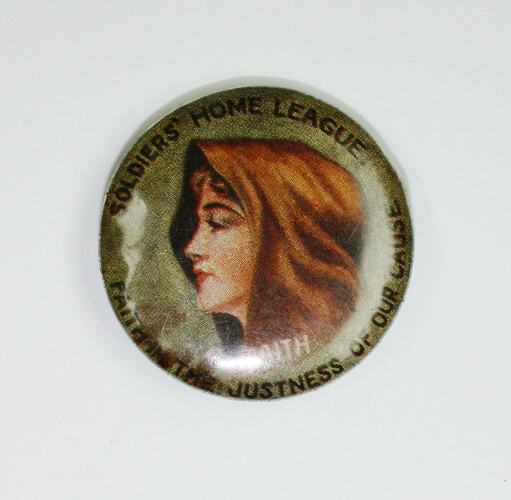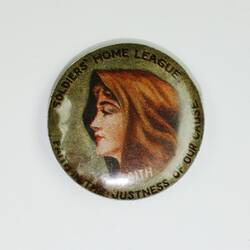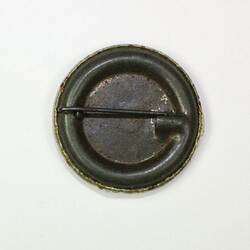Summary
Alternative Name(s): Button
Metal badge featuring an allegorical female figure of Faith with a brown veil over her head. The badge was sold to raise funds for the Soldiers' Home League, and is inscribed 'Soldiers' Home League / faith in the justness of our cause'.
The Soldiers' Home League was established in 1915 in South Australia to raise funds for a home for wounded soldiers. It was initially called the Peace Day League, but changed its name in May 1916 to the Soldiers' Home League of South Australia. On 30 March 1917 it held its first annual 'sale of bricks and buttons' to raise funds for the home that the League had just opened in Fergusson Avenue, Fullarton, Adelaide.
Physical Description
Metal badge, with the female head of the figure of Faith with a brown veil over her head. The badge was sold to raise funds for the Soldiers' Home League, and the words on the badge read: "Soldiers' Home League: Faith in the justness of our cause" "Faith". The woman is looking to the left of the badge. The background of the badge is green.
Significance
The significance of the Soldiers' Home League to the community during World War I is captured by a correspondent to the The Register (Adelaide), Thursday 7 February 1918, p.6:
'With the advent of button day for the Soldiers' Home League, it is fitting that the public should know what progress is being made with this deserving movement, the President of which is the Hon. J. H. Cooke, M.L.C. The league was first started in September, 1915, at the suggestion of Mrs. W. C. Wedler, the enthusiastic honorary organizer. The original proposition was to provide artificial limbs for wounded men; but, as this effort would have overlapped the work of another association, it was decided to found a home for wounded soldiers, and a building was purchased in Fullarton. Last year the Governor-General and the State Governor, with other distinguished persons, paid a surprise visit to the home, and expressed their appreciation of the magnitude of the work undertaken and their delight at its beautiful situation. The home to-day stands free of debt, and the penny scheme of collection, which is one of the principal sources of revenue, has brought in upwards of £1,400. The gifts range from a milch cow to a truckload of firewood, all sorts of furniture and cots for the use of the inmates, and special conveniences, such as crutches and the like. The home contains, in addition to the matron's quarters, kitchen and bathroom, five wards with dining room, rest room, and other conveniences. Through the efforts of the Unley school children the old garage has been converted into a fine recreation hall, completely furnished by them. There is no paid officer, but the home is nevertheless greatly in need of funds. There are 23 inmates, and several applications pending: and it may be necessary to put up an additional ward. 'Practically every denomination is represented on the committee. One feature of Friday's effort will be a competition among collectors to secure a 'Kewpie,' which has been presented for the most successful collector, and for a silver-mounted parasol to be provided for the runner-up. The prizes are to be presented at a fancy-dress carnival on the Park side bowling green next Tuesday evening, when His Excellency the Governor will be present'.
More Information
-
Collecting Areas
-
Acquisition Information
Transfer from Numismatics Collection, Museum of Victoria, 07 Aug 1995
-
Place & Date Made
-
Place Used
Australia
Likely to have been used in South Australia. -
Inscriptions
"Soldiers' Home League/ Faith in the justness of our cause" "Faith"
-
Classification
-
Category
-
Discipline
-
Type of item
-
overall dimensions
3 cm (Length), 3 cm (Width)
-
Keywords
Australian Military Forces, Community Organisations & Services, Wars & Conflicts, World War I Fundraising, World War I, 1914-1918, Allegorical Art


